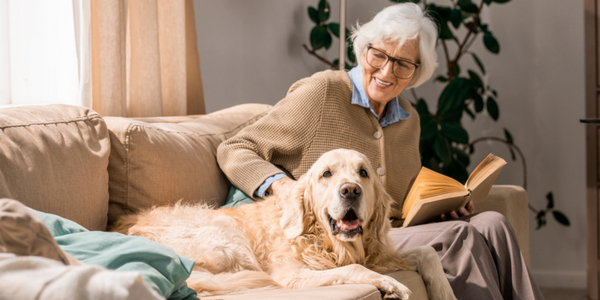You’ve likely heard of the benefits of having a healthy social circle, participating in volunteer programs and even having some go-to hobbies as you age. Did you know that an additional preventative method for maintaining your health in later years is having a pet?
That’s right, studies show that having a pet can be an essential asset to your daily routine as you age. From providing companionship to healing loneliness and depression, pets can help soothe the soul and give us purpose in our later years, offering unconditional love as we enter the last stage of life.
Our unique ability to bond with animals is one of the most profound aspects of humanity. At a young age, children can learn about empathy and compassion for others, and adults can express emotions they often cannot share with other humans. Pets can also nurture our physical health, helping to reduce stress and blood pressure while lowering the amount of cortisol in the body.
Cardiovascular Health Benefits
Believe it or not, a bond with a pet can do more than fill our heart with warm fuzzy feelings, pets can actually help improve cardiovascular health.
As we age, doctors begin to take an increased interest in blood pressure readings. This interest results from evidence that shows high readings are associated with higher risk of cardiovascular disease and stroke, and over the years research suggests that hypertension occurs at an increased rate in older people. Thus, the importance of monitoring blood pressure and cholesterol and taking preemptive steps to maintain good heart health.

Additional studies show that people who own pets tend to have lower blood pressure and cholesterol than those who don’t have pets because pet owners are more likely to exercise, eat more fruits and vegetables, and drink less alcohol than non-pet owners. All of these changes can help reduce the risk of heart disease, as well as other chronic illnesses like diabetes.
Helping You Stay Active
Studies have shown that people who own pets are more likely to be physically active than those who don’t have any pets. While cats may not be the first pet that comes to mind, both cats and dogs encourage their owners to move around more than those who don’t own pets. From getting out and going for walks more often, to moving more around the house compared to those who don’t own a pet.
This finding is especially true for senior citizens who may not want to go out in public alone, but were found to be more willing to take a stroll around the neighborhood to avoid feeling as though they were only sitting home all day.
To read more about A Healthy Approach to Active Aging, click here.
Keeping Your Mind Sharp
As we age, it’s natural for our brains to lose some of their cognitive abilities, especially when it comes to memory and problem-solving skills. These losses don’t have to be inevitable however. Studies have found that pets can help keep our mind sharp by stimulating our thought process and keeping our brain active. This is especially true if you have an animal that needs caretaking from time to time, such as scheduled feeding, grooming, or walking, as this will force you to think about how best to approach these tasks while minimizing any stress on your pet or yourself.
For additional tips on how to Improve Brain Health After 50, click here.
Boost Your Mood

In addition, pets provide unconditional love, which can be especially beneficial for older adults who may feel isolated, lonely or unloved.
A Therapeutic Approach for Those with Dementia or Alzheimer’s
In addition to keeping cognitive health boosted, for those with dementia or Alzheimer’s disease, having a pet can be extremely therapeutic. Studies show that interacting with animals helps improve mood among those with dementia by improving social interaction and reducing anxiety levels. In addition, interacting with animals also improves communication skills among those suffering from Alzheimer’s disease by helping them remember words they want to say before they forget again.
Reduction in Chronic Pain
Believe it or not, in addition to boosting your mood, a pet can also play a role in reducing your levels of chronic pain. According to one study, the presence of pets can help patients feel less pain and anxiety during medical procedures like surgery or chemotherapy. The researchers believe that this is because people bond with their pets over time, which helps them form stronger social relationships with others and reduces stress levels.
Pets can be a wonderful addition to life as one grows older. They can provide company, comfort, and a sense of security. If you are beginning to worry that you will be lonely as you age, it can be a healthy consideration to get a pet that is within your ability to care for. Not only do they offer great companionship, but they can also positively impact your health in a number of ways.
The key is to discuss pet options and care requirements prior to getting one to ensure your lifestyle and any physical limitations can accommodate the pet’s needs and visa versa.





